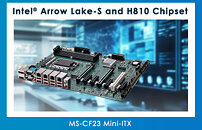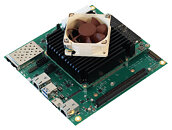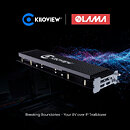Avalue Launches EPS-RPR Fanless Rugged Embedded System
Avalue Technology Inc., a global leader in industrial computing solutions, announces the release of its new EPS-RPR fanless rugged embedded system. As AI inference migrates from the cloud to edge devices, there is an increasing demand for fanless systems. Market research indicates that the global Edge AI Box PC market will grow from USD 1.141 billion in 2024 to USD 2.283 billion by 2033, at a compound annual growth rate (CAGR) of 6.2%. Designed in response to this trend, the EPS-RPR offers a high-performance, stable, and flexible embedded platform that is ideal for smart manufacturing, autonomous vehicles, and intelligent retail applications.
The EPS-RPR fanless industrial PC is powered by the 14th Gen Intel Core i9/i7/i5/i3 processors and supports DDR5-5600 memory, delivering robust computing power. Its fanless thermal solution and wide temperature tolerance (from -10°C to 55°C) ensure stable operation in harsh environments. In terms of I/O capabilities, the EPS-RPR model offers four 4K display outputs, dual Intel LAN ports (2.5GbE and 1GbE), six COM ports, and eight USB ports. This configuration is designed to meet the diverse needs of a wide range of industrial applications. The system also supports versatile expansion with 1× M.2 Key-B, 1× Key-E, 1× Key-M, and 1× mPCIe, enabling seamless integration with Wi-Fi, LTE/5G, and various I/O modules.
The EPS-RPR fanless industrial PC is powered by the 14th Gen Intel Core i9/i7/i5/i3 processors and supports DDR5-5600 memory, delivering robust computing power. Its fanless thermal solution and wide temperature tolerance (from -10°C to 55°C) ensure stable operation in harsh environments. In terms of I/O capabilities, the EPS-RPR model offers four 4K display outputs, dual Intel LAN ports (2.5GbE and 1GbE), six COM ports, and eight USB ports. This configuration is designed to meet the diverse needs of a wide range of industrial applications. The system also supports versatile expansion with 1× M.2 Key-B, 1× Key-E, 1× Key-M, and 1× mPCIe, enabling seamless integration with Wi-Fi, LTE/5G, and various I/O modules.

































































